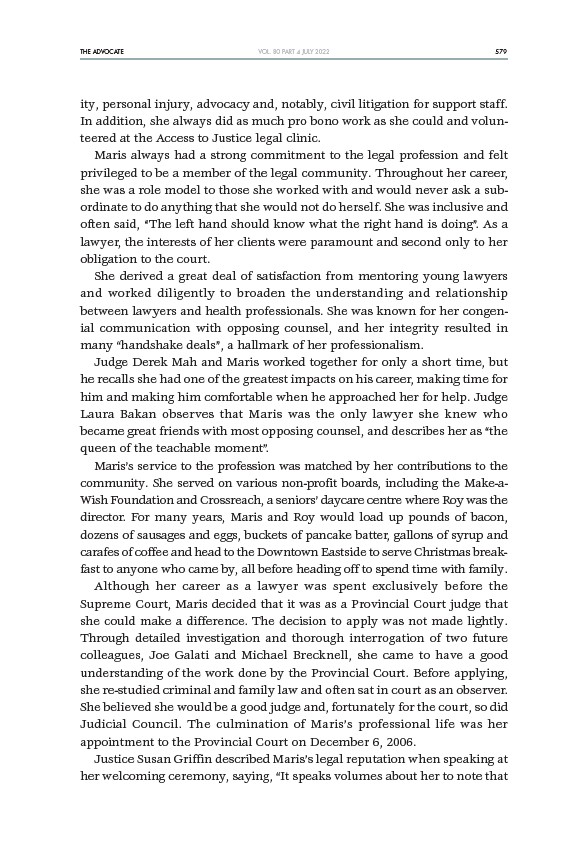
THE ADVOCATE 579
VOL. 80 PART 4 JULY 2022
ity, personal injury, advocacy and, notably, civil litigation for support staff.
In addition, she always did as much pro bono work as she could and volunteered
at the Access to Justice legal clinic.
Maris always had a strong commitment to the legal profession and felt
privileged to be a member of the legal community. Throughout her career,
she was a role model to those she worked with and would never ask a subordinate
to do anything that she would not do herself. She was inclusive and
often said, “The left hand should know what the right hand is doing”. As a
lawyer, the interests of her clients were paramount and second only to her
obligation to the court.
She derived a great deal of satisfaction from mentoring young lawyers
and worked diligently to broaden the understanding and relationship
between lawyers and health professionals. She was known for her congenial
communication with opposing counsel, and her integrity resulted in
many “handshake deals”, a hallmark of her professionalism.
Judge Derek Mah and Maris worked together for only a short time, but
he recalls she had one of the greatest impacts on his career, making time for
him and making him comfortable when he approached her for help. Judge
Laura Bakan observes that Maris was the only lawyer she knew who
became great friends with most opposing counsel, and describes her as “the
queen of the teachable moment”.
Maris’s service to the profession was matched by her contributions to the
community. She served on various non-profit boards, including the Make-a-
Wish Foundation and Crossreach, a seniors’ daycare centre where Roy was the
director. For many years, Maris and Roy would load up pounds of bacon,
dozens of sausages and eggs, buckets of pancake batter, gallons of syrup and
carafes of coffee and head to the Downtown Eastside to serve Christmas breakfast
to anyone who came by, all before heading off to spend time with family.
Although her career as a lawyer was spent exclusively before the
Supreme Court, Maris decided that it was as a Provincial Court judge that
she could make a difference. The decision to apply was not made lightly.
Through detailed investigation and thorough interrogation of two future
colleagues, Joe Galati and Michael Brecknell, she came to have a good
understanding of the work done by the Provincial Court. Before applying,
she re-studied criminal and family law and often sat in court as an observer.
She believed she would be a good judge and, fortunately for the court, so did
Judicial Council. The culmination of Maris’s professional life was her
appointment to the Provincial Court on December 6, 2006.
Justice Susan Griffin described Maris’s legal reputation when speaking at
her welcoming ceremony, saying, “It speaks volumes about her to note that